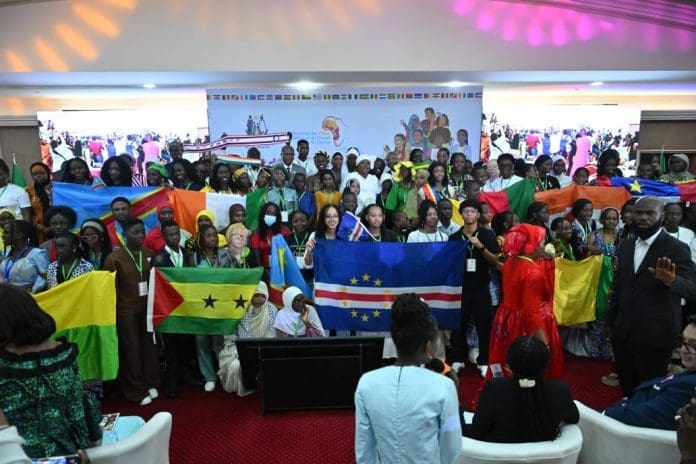Over 100 adolescent girls from across West and Central Africa gathered in Dakar for a watershed moment in gender equality advocacy. The inaugural Regional Girls’ Summit, organised by UNICEF and the Government of Senegal and coinciding with International Day of the Girl on October 10-11, culminated in the adoption of the “Dakar Declaration and Program of Action for Girls in West and Central Africa.”
What distinguished this summit wasn’t the presence of government officials or development agencies. Girls themselves drove the agenda through national consultations across 24 countries, guided by a Girls’ Advisory Group, determining their own priorities for change. The girls’ message was direct: “We want to be taken into account when our history is written because our voices are important,” as one participant from Equatorial Guinea stated.
The declaration firmly articulates six priority action areas, aligned with the 30th anniversary of the Beijing Platform for Action and Agenda 2063: Right to Education, demanding equal and secure access to quality education; Right to Health and Well-being, advocating for confidential and affordable health services; Right to Water, Sanitation and Hygiene, insisting on safe sanitation facilities; Right to Protection, demanding an end to Female Genital Mutilation and child marriage with legal age set at 18, and strict laws against violence; Right to Participation and Information, calling for active inclusion in decision-making spaces; and urgent action on climate change.
For Ghana, the declaration carries acute relevance. The prevalence of early marriage in Ghana stands at 29.2 per cent, affecting roughly one girl in three before her 18th birthday. Widespread gender violence affects more than 40 per cent of girls aged 15-19 years, while 14.1 per cent of women in this age group had experienced sexual violence.
The numbers obscure the human toll. Child marriage is substantially associated with numerous unintended births, pregnancy termination, and female sterilization, with women who married as children having lower schooling levels and being more likely to accept patriarchal gender roles. In Northern Ghana specifically, one in five girls marry before their 18th birthday and one in 20 girls is married before her 15th birthday.
The Dakar Declaration represents a fundamental shift in how girls’ rights are advocated. Rather than adults speaking about girls, girls themselves spoke for themselves. Senegalese Minister Maimouna Dièye hailed the groundbreaking nature of this “unprecedented partnership with girls,” noting that the agenda would be “carried by girls, for girls.”
Regional leadership responded with concrete commitments. Prime Minister of Senegal Ousmane Sonko, through his Minister of Family and Solidarity, made a solemn commitment to widely share the Dakar Declaration within government, form a reflection committee for its implementation, and called on all states and partners “not to make it a simple document, but a binding roadmap.”
UNICEF Deputy Executive Director Omar Abdi urged for measurable progress, saying “We must not leave this meeting and come back after two years to start from where we were, but rather have a clear measure of progress.” That emphasis on accountability matters. Previous regional commitments on girls’ rights have generated declarations without sustained implementation.
The summit also signalled evolving attitudes among young men. Sampson W. Tweh, a 17-year-old from Liberia, marked a crucial shift in mindset by stating: “The Summit made me understand that we boys are not supporters of girls but allies.” That reframing from support to partnership addresses a fundamental challenge: gender equality cannot succeed when women and girls advance alone.
UNICEF Regional Director Gilles Fagninou underscored the severity of the situation: “The statistics on well-being are the worst when we compare West and Central Africa to other regions of the world.” Yet he insisted on the potential for transformation. “Where there is a small opportunity for the girl, the return on investment for the community or country, for the region and for the world, has been unparalleled.”
For Ghana, implementing the Dakar Declaration demands action beyond rhetoric. Ghana has ratified the Convention on the Rights of the Child and the Convention on the Elimination of All Forms of Discrimination Against Women, with the government launching a 10-year national strategic plan to combat child marriage in 2016. Yet regional variations in child marriage prevalence persist, with engagement from communities, including tribal leaders, being essential to shift cultural attitudes.
A 16-year-old from Togo, Lelengda Tchakebera, articulated the gap between promises and reality: “What I expect as an outcome is that all the laws passed in our different countries will be translated into concrete actions for an effective fight for the protection of children.”
The Dakar Declaration succeeds not because it introduces new principles. Rather, it succeeds because girls from Ghana, Nigeria, Sierra Leone, and 21 other nations demanded that leaders stop treating gender equality as peripheral policy and start treating it as foundational to development itself. The measure of success will be whether governments move from binding commitments to binding results.
Source: newsghana.com.gh











